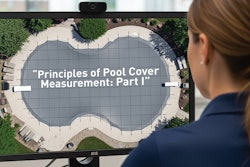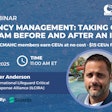
With the merger of NSPF and APSP, redundancies throughout the two organizations are being eliminated to achieve the goal of an industry association that educates and advocates in an efficient, straightforward manner.
As two organizations, NSPF and APSP competed for many years with separate education systems, code regimes and administrative departments, so untangling these lines will be the work of many months.
Measures are now underway under the leadership of PHTA’s Education Task Force to rationalize the different training and certification systems.
For many years, NSPF operated a successful CPO (Certified Pool Operator) program. In recent years, APSP developed a certification program to compete with CPO called PPSO (Professional Pool and Spa Operator). The Education Task Force went with the CPO brand overall, with some caveats.
“CPO was designed to enable a pool operator to be ready for the job on day one, and with a longer history and recognition at the state level for licensing purposes and general brand awareness, CPO was choice as the name going forward, with some changes,” says Silvia Uribe, PHTA director of education.
The board decided to create a tiered system based on the CPO certification, with the exact names yet to be decided. “The basic level, which could be called ‘CPO level 1’ or ‘CPO Entry Level,’ something along those lines, will be based on current CPO content.”
A second, higher level, containing extra, augmented CPO content related to management, could become CPO level 2, she says. “And in this way we’d have a tiered system that would allow us to add a third level sometime in the future for engineers. This would create a career path for the commercial sector.
That is the plan as envisioned by the board, but the transition period is only beginning. “What’s important to remember is the timeline involved,” Uribe says. “This plan is not going to take effect overnight. Our instructors are going to continue teaching PPSO and CPO as they exist right now. The full implementation of this plan is targeted for January 2021.
“We need to review content and create additional content over the next year, and there are other pieces of the puzzle that need to be worked out. We need to integrate our systems and make sure they work together before the full rollout.”
Those steps will consolidate CPO and PPSO, courses for pool operators, but the Task Force also faced a similar dilemma in service certification. Prior to the merger, APSP had the CST (Certified Service Technician) for service pros, and NSPF had the AST (Advanced Service Technician). When the dust settles after a transition period, CST will be retained and AST will be eliminated.
“AST certification is scheduled for sunsetting,” Uribe says, “but we have a plan to recognize those students who took the AST exam and received that certification — we won’t just leave them hanging. If their certification is still valid, we are going to give them free access to take the CST course exam so they can gain the opportunity to obtain the CST certification.”
That transition will also be rolled out next year, in 2020.
Two more programs were not exactly competing, but they were similar: APSP’s Train the Trainer course and NSPF’s Instructor course. These two will be fused into one, called the PHTA Instructor course.
“We decided to take the best of each of these courses and create a single one where we can assess candidates that want to teach any of our PHTA courses. This will be a very robust PHTA instructor course,” Uribe says.
“And this one is about 95% complete. And we are expecting to enroll our first class in April 2020.”
The PHTA rationalization of NSPF and APSP is ongoing, and is expected to take many months, but ultimately the new association expects to see significant cost savings as a result.








































